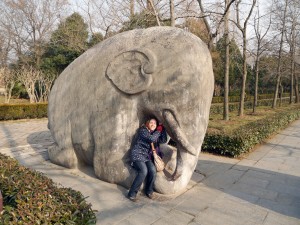Hi! My name is Anna. I’m a foreign language teacher and translator and I teach German and English at a Foreign Language Middle School in Shanghai. My school is a little different from other public middle schools in China because our students can study two foreign languages and choose from English, Japanese, German, French and Korean.

With grade 5 students who attended my “model” lesson for new students at our school’s open day in January
What age group did you work with? What were the pros and cons working with this age group?
There are many factors that make teaching a particular class more or less enjoyable. There is the students’ age, the size of the group, their foreign language level and external factors like the time of day, the seating arrangement, the temperature in the classroom or their homeroom teacher (don’t underestimate the influence of the Chinese teachers on your classes!).
I teach students from age 11 to 18, that is grade 6 to 12 in my school. My biggest class has 48 students, my smallest only seven. I see all my classes once a week for forty minutes. The smaller the group the more I notice individual differences due to the students’ personalities but there are things that certain age groups have in common.
My grade 6 students have just started middle school. Their language level is low but they are very keen, curious and energetic. Most of the time this helps my lessons since it’s easy to get them engaged and interested. They love playing games and compete for the quickest answer or finishing the task first. On the downside “energetic” can turn into “chaotic”. I allow a certain level of noise and excitement when it is a sign of participation, but when I feel like I’m losing control of the group I end the exercise and make a clean break to calm the class down. The hardest part of teaching learners with low language skills is to make sure they understand your instructions. I have to do a lot of modelling. To model pair or group speaking exercises for the younger students I bought animal finger puppets. I use them to basically role-play an example of the exercise with the animal characters and then the students follow my example.
Grade 8 might be my favourite grade to teach. The kids are still curious and motivated and not as overworked as the higher grades. Their language level is good enough that I can choose slightly more advanced topics. It also easier to find authentic texts/video/sound recordings they can understand.
Grade 9 is where things get serious for the students since they have to take the Zhongkao, the senior high school entrance exam. Most students spend all day every day studying either in school or at home. They are noticeably more tired and less energetic than the grade 6-8 students. From grade 9 upwards a lot of my students try to do their homework or study for other subjects more or less secretly in my lessons. Others sleep with their eyes open. And how could I blame them? It gets harder to make them take the foreign teacher’s lessons seriously. They know that I don’t mark their exams and I rarely give homework either. My means of exerting external pressure (grades, punishments) is very limited, so I have to spend more time preparing interesting topics and a variety of activities so the students don’t get bored. I’ve also noticed that, the older the students, the wider the gap in terms of language level between students in one class. In grade 10 and 11 I have some students who speak pretty fluently and others who struggle to string three words into a sentence. The advantage of working with older students is that I can choose topics that are intellectually a bit more stimulating. All in all I would say that teaching the youngest and the oldest students takes more preparation time but every age group has its charms and difficulties.
Did you change as a teacher over time? If so how?
That would be a question for my students to answer.
I guess with more teaching experience I’m more confident and relaxed now although I still get the occasional flashes of stage fright just before a lesson, especially on Mondays. Towards the middle of the year I got a bit too relaxed and I noticed that my students got noisier and less focused, so I’m trying to be stricter at the moment.
What was your favourite moment in class and why?
I don’t think I have a single favourite moment but I love watching my youngest students in grade 6 improve by leaps and bounds. I teach them German so they literally start from zero. It’s incredible what they have learned in ten months. The first few months I struggled a lot to communicate with them in class but now they approach me and want to talk to me in German. It makes me feel proud. Another funny and touching moment happened when I wore my hair down for the first time in class. In the summer I always put my hair up in a ponytail because it’s just too hot here. In October I finally wore my hair down for the first time and when I entered the grade 10 classroom, all the students went: Ooooooh! I was confused and asked what was going on. They told me it’s because I looked pretty. 😀 All my Chinese students are generous with compliments. They can be exasperating at times but generally they are an adorable bunch.

At Shanghai’s first Comic Con with my friend and colleague Jon
What did you do in your spare time?
There is a lot to do in Shanghai. Once you figure out how to find out about the things that are going on, you’ll never be bored. During the week I’m usually quite tired in the evenings so I don’t go out after work much. I joined a choir (Shanghai International Voices) which rehearses once a week but that’s my only regular activity. Sometimes I go out for dinner with my foreign colleagues. I try to go for a run twice a week to stay healthy but I didn’t join a gym. To relax at home I watch a lot of Korean and Chinese TV shows online or skype with friends and family at home. On the weekend I explore Shanghai, go shopping or meet with friends. I have a Chinese friend who I help with her German studies and in return she teaches me some Chinese. Here are some of my favourite things I’ve done in Shanghai: go to K-Pop concerts, visit the Shanghai Ocean Aquarium, go shopping at some of the hundreds of malls (my fav: Cloud 9 and Metro City), eat out at restaurants with various international cuisines (Da Gu Road e.g.), go to Shanghai’s first ever Comic Con, see a musical and a ballet, souvenir shopping at Tianzifang…
When it comes to travelling outside of Shanghai, it always depends on how much time off you get. Some schools are quite generous with giving foreign teachers time off, some aren’t. Even when I don’t have classes all day e.g. because of exams, my school insists on me staying in the office which is pretty annoying to be honest. I once had an entire week without classes but was forced to stay on campus during the day…
Some helpful websites for making the most of your free time:
smartshanghai.com / smartbeijing.com
timeoutshanghai.com / timeoutbeijing.com
damai.cn / en.damai.cn (tickets for events, the Chinese version has a lot more events listed!)
gewara.com (events and movies, all in Chinese)
the baidu maps app for your phone (the Chinese google maps, all in Chinese but easy to navigate, makes taking the bus a piece of cake!)

Sightseeing weekend in Nanjing
Where did you travel to in China, and how did you go about it?
On my first trip in China during the national holiday week in October I went to visit a fellow English teacher in Guiyang, capital of Guizhou province. If I hadn’t had a friend there I would have never thought of going to Guiyang. It’s not a huge tourist destination but it was probably the most interesting trip I’ve made here. It took a 28 hour hard sleeper train to get there, and because all of China travels during that week I didn’t manage to get a sleeper ticket on the way back, so I had to sit on a hard seat for 26 hours. It was an interesting experience but not one I plan to repeat. I also went on a long distance train ride to Shenzhen for a weekend in November and spent another weekend in Nanjing in December. In general train travel in China is a pretty pleasant, cheap and efficient way to travel as long as you stay away from +10 hour hard seat journeys. It’s also a lot more environmentally friendly that flying! Here is a good guide to train travel in China:
I went to Beijing as well for four days doing all the touristy things like Forbidden City, Tiananmen Square, Peking Opera and the Great Wall. It was a great trip. During our four week winter holiday I spent four days in Xi’an visiting the Terracotta Army and the many other attractions the city has to offer (don’t miss Muslim street and the Great Mosque!). I also went to Japan. In June I have a day trip to Suzhou and six days in Korea planned. If you are the spontaneous type, just buying a train ticket to somewhere and sorting everything else out when you get there is entirely possible. I prefer planning things in advance. Good websites to plan trips are:
lonelyplanet.com
travelchinaguide.com
ctrip.cn (for booking trains, flights, hotels)
chinatraintickets.net (for trains and flights)
hostelworld.com
What are your plans for the future?
I want to stay in Shanghai and I’m thinking about a career as a language teacher more long-term. As a German native speaker there aren’t that many opportunities teaching German in public schools or universities in Shanghai for me. I’ve been moving a lot in the past few years and I’m not ready to leave and relocate my entire life again. So I’ve decided to stay at my school for a second year. I’ve settled in my job, I’ve made friends here and there is so much more I want to do and see in China. I’m hoping to find more time to improve my Chinese next year as well.
Check out my (German language) blog for more pictures!
By Anna-Maria Linhard


Leave A Comment
You must be logged in to post a comment.